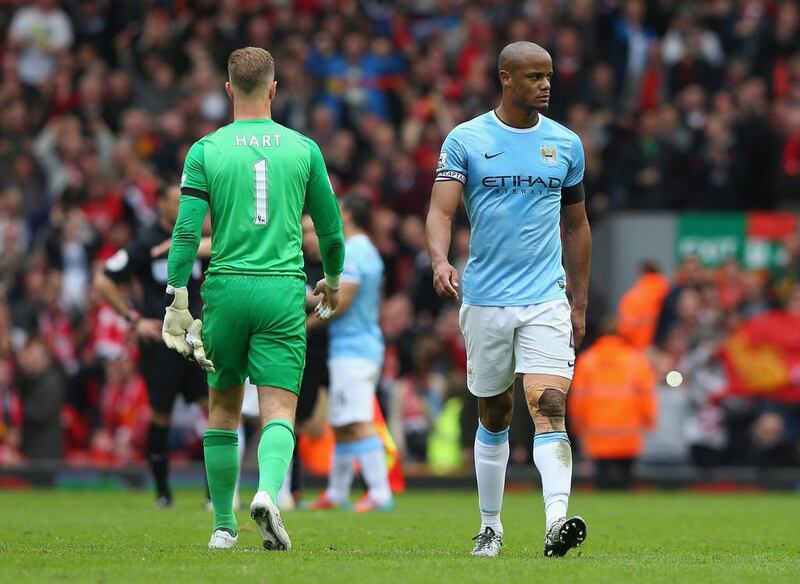In the end, it was an individual error from Vincent Kompany that undid Manchester City, his mis-kick in attempting to clear a Glen Johnson throw-in presenting an opportunity to Philippe Coutinho. To ascribe the defeat to that, however, would be misleading. It was an individual error, and it did come at a time when City seemed on top, but it was entirely in keeping with a game in which City’s spine had struggled.
Any side, no matter their resources, will struggle when key players are unavailable. It is not so much the ability of the players who remain, as what the absence of those key players does to the overall structure.
City, effectively, were without their entire backbone. Sergio Aguero, still recovering from a hamstring injury, was deemed fit enough only to start on the bench.
Yaya Toure was forced off with a hamstring problem after 19 minutes – not that he had seemed to have the pace of the game – while Kompany played despite a knee injury.
Whether that restricted him is difficult to say, but certainly the way he fell for the Raheem Sterling feint that brought the first goal smacked of a player looking to pre-empt his opponent because he did not trust his body to react accordingly.
Kompany, who has been uncharacteristically shaky this season, was at fault for the second, allowing Martin Skrtel to out-muscle him before glancing the ball in at the near post.
Had he been fully fit, would he have made a better job of clearing the dropping ball before the third goal?
Possibly, possibly not.
Whatever the reason, the truth is that Kompany, a likeable man, an impressive captain and a very good defender, was at least partly responsible for all three Liverpool goals.
“He played because he could play,” said the City manager Manuel Pellegrini, insisting Kompany’s fitness had not been an issue.
“I’m disappointed because today we lost a game that we didn’t deserve to lose,” Pellegrini said.
“I thought we played very well, especially in the second half and the last 15 minutes of the first half. We had good chances to score, but football is made from good things and mistakes, and we made a mistake and they won the game.”
The opening half-hour, though, was a major problem. Although familiarity does seem to have strengthened it, the Toure-Fernandinho axis has looked a potential vulnerability all season, and so it proved, with Raheem Sterling, deployed centrally, repeatedly finding space.
Things improved once Javi Garcia came on, but it was only with the introduction of the habitually underestimated James Milner for the anonymous Jesus Navas that City really began to make headway.
“They started very well,” Pellegrini said of Liverpool. “We rearranged it and in the last 15 or 20 minutes, we had two clear chances. In the second half, I think there was just one team on the pitch.”
Milner was involved in both City goals, but just as important was his work shuttling back and helping out in central areas, something that allowed them to take charge of the midfield in a way that would have seemed impossible before half time.
Even after conceding the third goal, City could have gotten back into it as Skrtel handled in dealing with a deep cross.
Pellegrini refused to make a big deal of that incident, however, and it was deceptive: City's increasing reliance on direct play after replacing Edin Dzeko with Aguero was mystifying.
Kompany will take the blame, but this was an occasion in which City’s vulnerabilities all over the pitch were ruthlessly highlighted.
sports@thenational.ae
Follow us on Twitter at @SprtNationalUAE





